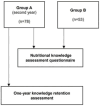Integrating Active Learning Methodologies into Clinical Nutrition Education for Nursing Students: A Quasi-Experimental Study
- PMID: 40137650
- PMCID: PMC11944427
- DOI: 10.3390/nursrep15030077
Integrating Active Learning Methodologies into Clinical Nutrition Education for Nursing Students: A Quasi-Experimental Study
Abstract
Background: Clinical nutrition is essential in nursing care, with nurses playing a key role in supporting patients' dietary needs. Aim: To assess the impact of active learning methodologies on clinical nutrition education, focusing on knowledge retention among nursing students. Methods: Using a quasi-experimental research design, we enrolled 131 s-year nursing students. Both groups attended an eight-hour seminar on clinical nutrition, incorporating critical thinking. The experimental group had prior exposure to active learning and ICT in their first-year course, while the control group received traditional teaching. Knowledge was assessed using a validated questionnaire on basic and clinical nutrition. Results: The experimental group scored higher in both basic and clinical nutrition, indicating that active learning improves immediate learning and long-term retention. One year later, they retained significant knowledge, particularly regarding nutrient-disease relationships. Conclusions: Active learning, particularly critical thinking, enhances short- and long-term outcomes in clinical nutrition education. Future studies should refine assessment tools and explore further integration of active learning into nursing curricula.
Keywords: active learning; clinical nutrition; critical thinking; education; information and communication technology; nursing students.
Conflict of interest statement
The authors declare no conflicts of interest.
Figures
Similar articles
-
Comparing the effects of traditional lecture and flipped classroom on nursing students' critical thinking disposition: A quasi-experimental study.Nurse Educ Today. 2018 Dec;71:151-156. doi: 10.1016/j.nedt.2018.09.027. Epub 2018 Sep 28. Nurse Educ Today. 2018. PMID: 30286373
-
Team-based learning versus traditional didactic lectures in teaching clinical biochemistry at King Abdulaziz University; learning outcomes and student satisfaction.Biochem Mol Biol Educ. 2021 Jul;49(4):546-559. doi: 10.1002/bmb.21501. Epub 2021 Mar 17. Biochem Mol Biol Educ. 2021. PMID: 33729707
-
Student and educator experiences of maternal-child simulation-based learning: a systematic review of qualitative evidence protocol.JBI Database System Rev Implement Rep. 2015 Jan;13(1):14-26. doi: 10.11124/jbisrir-2015-1694. JBI Database System Rev Implement Rep. 2015. PMID: 26447004
-
Bachelor nursing students´ and their educators´ experiences of teaching strategies targeting critical thinking: A scoping review.Nurse Educ Pract. 2022 Aug;63:103409. doi: 10.1016/j.nepr.2022.103409. Epub 2022 Jul 12. Nurse Educ Pract. 2022. PMID: 35868062
-
How gaming is used as an innovative strategy for nursing education.Nurs Educ Perspect. 2007 Sep-Oct;28(5):263-7. Nurs Educ Perspect. 2007. PMID: 17944262 Review.
Cited by
-
Relationship Between Obesity and Impairment of Cognitive Functions: An Investigation into the Integrated Role of Nutritional Education and Physical Activity in Lower Secondary School.Nutrients. 2025 Jul 31;17(15):2531. doi: 10.3390/nu17152531. Nutrients. 2025. PMID: 40806114 Free PMC article.
References
-
- Van Den Berg G., Vermeulen H., Conroy T., Van Noort H., De Van Der Schueren M., Huisman-de Waal G. Factors influencing the delivery of nutritional care by nurses for hospitalised medical patients with malnutrition; a qualitative study. J. Clin. Nurs. 2023;32:5147–5159. doi: 10.1111/jocn.16614. - DOI - PubMed
-
- Cárdenas D., Toulson Davisson Correia M.I., Hardy G., Ochoa J.B., Barrocas A., Hankard R., Hannequart I., Schneider S., Bermúdez C., Papapietro K., et al. Nutritional care is a human right: Translating principles to clinical practice. Clin. Nutr. 2022;41:1613–1618. doi: 10.1016/j.clnu.2022.03.021. - DOI - PubMed
LinkOut - more resources
Full Text Sources



